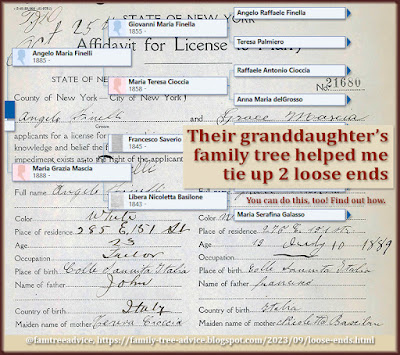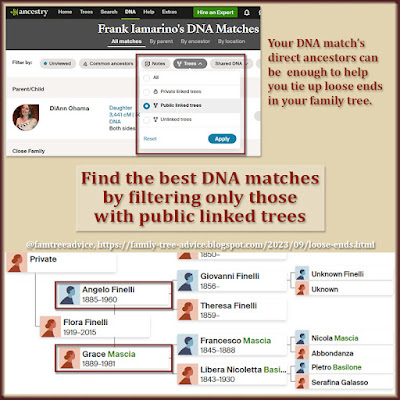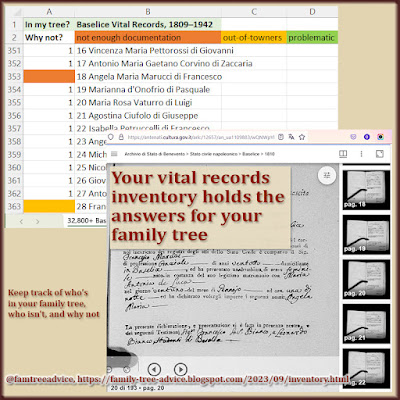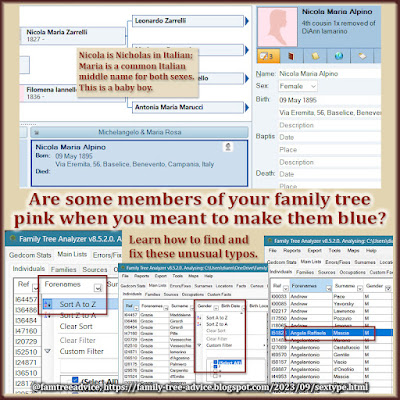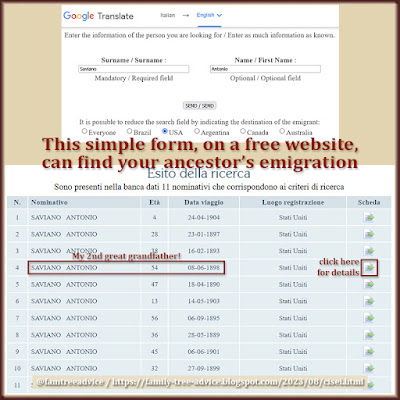While visiting my mom last June, I had some time to pass one afternoon. I pulled out my laptop to work on one of my genealogy projects. I was renaming a few downloaded Italian birth records to make them searchable. My format for renaming these files is:
- the document number
- the child's full name
- the word "di" (that's "of" in Italian)
- the father's first name.
For example: 1 Emiddio Pennucci di Nicola
With this format, I can easily search for every child of Nicola Pennucci. It's very powerful.
 |
| Spend time with lots of vital records from your ancestral hometown to become a pro at reading them and gathering the facts you need. |
I gave my mom a peek a my computer screen. These were not the neatest vital records, but they weren't giving me any trouble. I showed her a birth record and pointed out the key facts. "Here's the baby's name and the day they were born. Here's the father's name and age, and over here is the mother's name and age. This column has the baptism date, and this part is their home address."
Her mouth dropped open. "How can you read that?"
"I learned," I told her. "It's all about practice."
Learn By Doing, Over and Over
The amount I've learned purely through practice hit home a couple of weeks ago. I was doing a document-by-document review of vital records from Grandpa Leone's hometown. Most of the people in these records were already in my family tree. I reviewed them all to see who I'd missed.
I found a few mistakes I'd made many years ago when I had my first look at this town's vital records. I thought they were silly mistakes. They were a little embarrassing. But I was completely new to Italian records back then, and viewing them on bad microfilm. I was lucky to make out any of the details.
Some of my earliest work included misspellings of names that are second-nature to me now. When I first learned Italian numbers, there were a couple that took me longer to memorize. (Numbers are important because they wrote dates and years in longhand.) So sometimes I got a date wrong.
Don't Miss Out on the Adventure!
Here's a hard truth. You can't join a Facebook genealogy group, say your family names, and expect someone to hand you your family tree. I see these requests every single day! No details. Just, "Here are my grandparents' names. Can anyone tell me about them?"
So here's my question for those who haven't done any research, and those who ask for a translation of every document they find. Why aren't you putting in the effort? You can—and will—learn so much by doing the work.
Family-tree building is a journey. Genealogy research is an intellectual exercise that will teach you many things. Isn't it better to walk the path and experience wonders along the way than to be dropped at the destination and sent straight home?
Take the First Step
If you don't know exactly where your ancestors came from, finding out is your first task. Putting your ancestors' names out there and hoping to find a relative with all the answers is folly. When you discover their hometown, you can search for vital records to help you understand their lives.
If you don't know their hometown, and you've already asked your entire family if they know, you can:
- Search for your ancestor's paper-trail of documents. For an immigrant, a ship manifest or naturalization papers may say where they came from. A census will almost never have the answer, but draft cards and applications may.
- Take a DNA test and see where your closest matches' roots are.
- Search Ancestry or FamilySearch for your ancestor's last name and see where others with that name came from.
I'm lucky that both my grandfathers told us where they came from. When a cousin-in-law told me how my 2nd great grandmother pronounced her hometown, I used a favorite trick to figure it out. She had a common last name, Caruso, that comes from many places in Italy.
I searched Ancestry passenger lists for any Caruso arriving in America in the early 1900s. Then I scanned the results for their hometowns. When I spotted the right one, I said it aloud. I had no doubt I'd found her hometown!
When her hometown's vital records appeared on the Antenati website, I found my 2nd great grandmother's birth record. I discovered she was a twin, but her twin brother died immediately. Now knowing her parents' names, I searched for and found all her brothers. Then her aunts and uncles. And their families. And generations of ancestors.
Her hometown was the key to EVERYTHING.
Learn Enough of a Language to Get the Goods
Don't let the sight of a foreign vital record overwhelm you. You don't need to translate every single word on the document. Have you ever filled in a standard form? Do you need to read every single word or do you just start entering your name and address?
Vital records are like a form-letter where there's a bunch of standard wording. It's the unique facts that you want. Who cares who they mayor was when your ancestor was born? You want to know baby's name, the date, the place, the parents' names and ages, and maybe check out the witnesses.
The FamilySearch Wiki gives you the genealogy keywords to look for on vital records in tons of languages. Thanks to the Wiki, I can read Latin records, but I keep that Wiki bookmark handy.
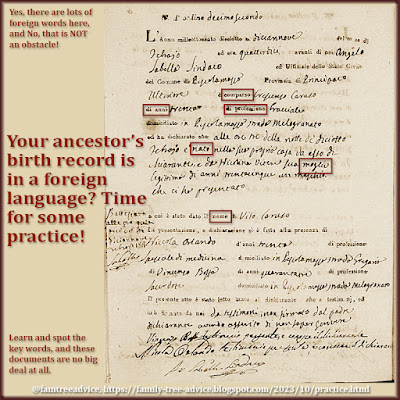 |
| Ancestor's birth record in another language? Relax. You don't have to read every word. |
Last week I translated the important parts of an Italian vital record for a stranger on Facebook. The handwriting was quite neat. When I gave her the translation, she asked, "How did you do that?" The answer is practice.
I spend so much time looking at Italian vital records from my ancestral hometowns that:
- I know the town's names so well I can overcome bad handwriting.
- I literally dream of translating documents. That's why I like to say I can translate the records in my sleep.
There's no reason you can't learn what you need to translate your ancestors' vital records. Sure, some documents are notoriously hard to read. When that happens, maybe you'll want to reach out to the genealogy community for help. Or maybe you'll figure it out for yourself.
One time I discovered a new ancestor who came from another town. Her unique last name was impossible to read. But I had a few options, and I did figure out her name.
Now you've got to ask yourself what you want. Do you want a stranger to hand you a family tree that may or may not be yours? Or do you want do actively discover your ancestors? You. Can. Do. This.
Here's more help with Italian vital records:
